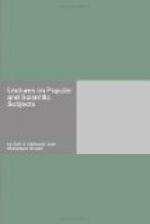PAST AND PRESENT MEANS OF COMMUNICATION.
We may, I think, commence by saying, “Lord, so teach us to number our days that we may apply our hearts unto wisdom,” for, as David says, “What is man that Thou art mindful of him, and the son of man that Thou visitest him? Thou makest him to have dominion over the works of Thy hands, and hast put all things in subjection under his feet.” The difference of past and present means of communication are so great, that it is no easy task to enter into a discussion on the subject; but it leads one to gravely consider what is said in the 90th Psalm: “So teach us to number our days, that we may apply our hearts unto wisdom.” To address an association such as I have now the honour and pleasure of doing, gives one a feeling of interest, as well as a feeling of responsibility, for as I have been kindly asked to close the course of lectures for this session, such an address is looked to in general with expectation. Do not hope for too much from me; but I trust that, when I have concluded, you will not be able to pay me the compliment an old Highland woman did to her minister on seeing him after church-service—“Ah, maister, this discoursing will never do, for I wasna weel asleep till ye were done.” Having said this by way of introduction, I think it devolves upon me in some way first to explain what is the meaning of the subject of Communication. It may be briefly stated to be a means to an end—an intercourse or passage of either the body from one place to another, or of the thoughts of one person to another. And as I begin with the communication of the body, I cannot do better than name some of the methods by which communication is carried on, and shall commence with Roads, Coaches, Railways, Canals, and Steamers. Then, for mind, I will take Books, Printing, Letters, Exhibitions, and Telegraphs.
Our age has so advanced, that though Methuselah lived nearly one thousand years, yet he in his age did not live as long as we do now. See what science and art have done for us. We now do more in one day than could be done in a month some very few years ago; and, as far as travelling about the world is concerned, I can say that I have been from John-o’-Groat’s House to Brighton, thence into Hertfordshire, thence back to London, from there to Edinburgh, thence to John-o’-Groat’s, and here I am before you, without fatigue, or a thought that I should not be present in time. What has enabled us to do




